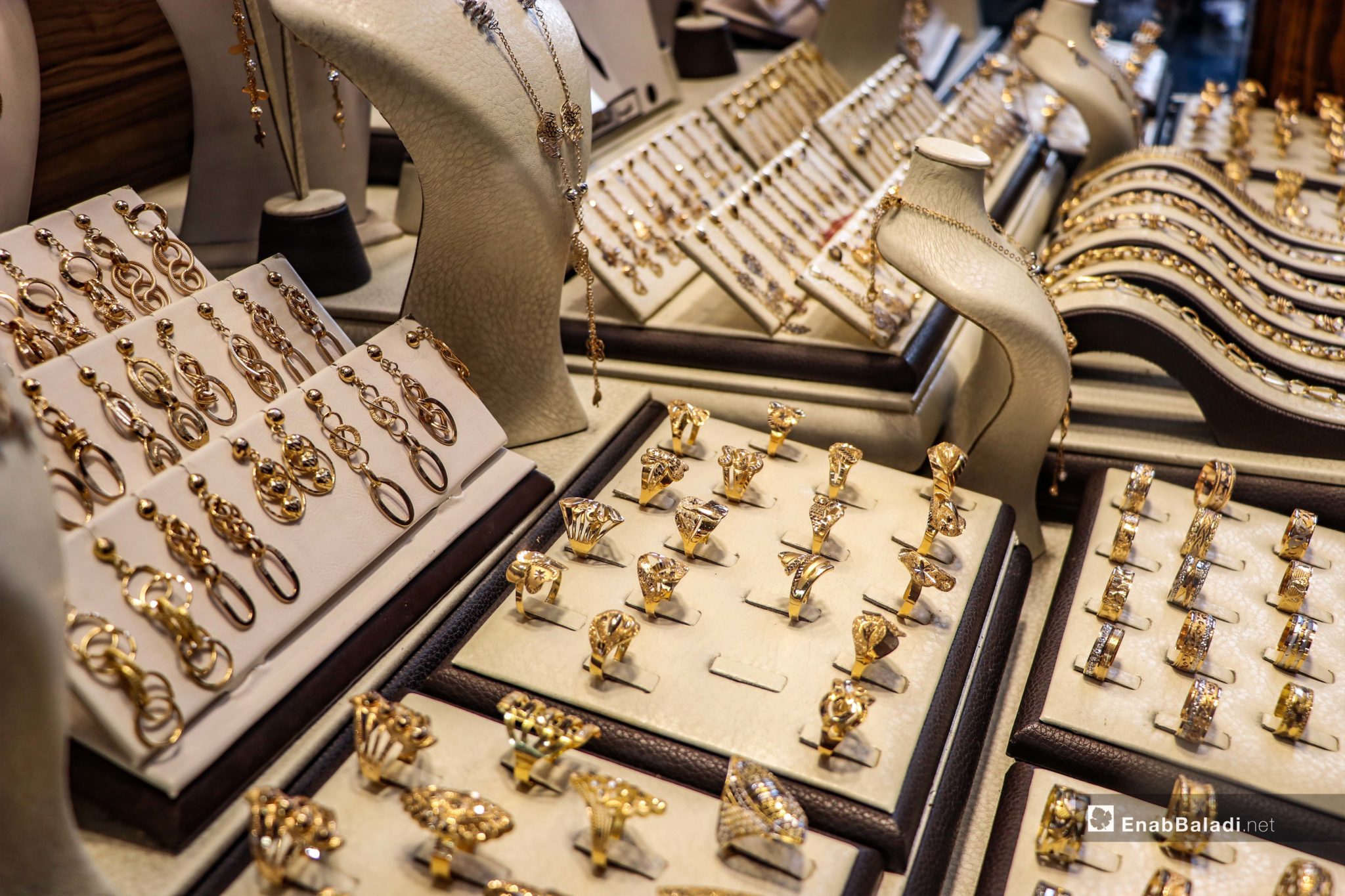



Enab Baladi – Jana al-Issa
Gold workshops in Idlib, northern Syria, are compelled to use broken gold to craft new jewelry due to the inability to import gold bars into the region.
The lack of importing ability is caused by several issues, primarily general import barriers to the region regardless of the material, and the high cost of importing gold bars specifically.
According to several experts, crafting new jewelry from previously used, broken gold negatively impacts the quality of the new product. This means the gold can only be consumed locally, without the possibility of exporting it abroad.
The predominant type of gold available in the province is 21-karat, from which most market pieces are made. Meanwhile, 24-karat gold is reserved for bars and ounces, and 14-karat gold is used for fine pieces given as gifts to children. There is no market for 18-karat gold due to lack of demand.
Engineer Abdullah al-Masri, the Director-General of Industry in the Ministry of Economy of the Syrian Salvation Government (SSG) in Idlib, told Enab Baladi that the main reason behind the inability to import gold bars is the price difference.
Al-Masri explained that the price difference is equivalent to USD 1.2 per gram of gold, meaning approximately USD 1200 per bar. This price discrepancy forces workshop owners to forego gold bars and rely on broken gold as an alternative.
Musab al-Aswad, a representative of the Goldsmiths Association, stated that there is no law allowing the import of bars into Idlib. Still, they may be available in small quantities at higher-than-global prices through smuggling.
Al-Aswad highlighted that among the significant challenges faced by goldsmiths in Idlib are the lack of maintenance for crafting machines, the difficulty and cost of importing crafting equipment, the challenge of obtaining wax models for casting which sometimes get damaged, and the scarcity of skilled labor for some specific types of work.
There are between 10 to 14 gold crafting workshops operational in Idlib, each employing around ten workers. The monthly production volume, depending on the type of workshop (fine or rough products), is estimated to be about 120 kilograms of gold. Production volume varies between months with high demand and months with low demand.
Regarding the primary challenges faced by the gold crafting sector in Idlib, Director-General al-Masri noted that Idlib’s small geographic area limits production, in addition to the high number of gold crafting workshops, which increases competition.
Al-Masri added that some supplementary materials for crafting workshops are imported from Turkey, a process that encounters several issues and increases the difficulty of gold crafting operations.
The reason behind not importing gold bars is the absence of state control, official crossings, and institutions that monitor the quantity of gold available and ensure it is not tampered with, according to Dr. Firas Shaabo, an expert in financial and banking sciences.
Shaabo explained to Enab Baladi that Turkey would not allow gold to be exported from its territory, considering it a depletion of Turkish resources, further impacting the ability of goldsmiths to import gold.
Melting down broken gold and crafting it multiple times with the available means will impact the quality of the crafted gold. Compliance with internationally recognized manufacturing standards is necessary to ensure gold can be traded and sold.
Dr. Firas Shaabo, Expert in Financial and Banking Sciences
Shabo believes that gold crafting requires significant legal and regulatory controls to prevent any manipulation or fraud that could harm consumers eventually.
Engineer Abdullah al-Masri also confirmed that broken gold affects the quality of the final product, stating that golden bars’ quality is superior to used gold.
According to Director-General al-Masri, demand for gold markets in Idlib is moderate. He indicated that buying and selling activities in the markets are very good except for a few months every year, particularly the winter season.
The price of a gram of 21-karat gold in Idlib markets is USD 66, equivalent to 2,112 Turkish lira (the Turkish lira is the currency used in the region for daily transactions).
There have been numerous cases of fraud in the gold markets of Idlib, lacking full governmental oversight to prevent such occurrences.
According to observations by Enab Baladi, these fraudulent cases range from tampering with the weight and crafting quality to selling old, used gold at the price of new after polishing it, and making extra money from civilians unable to distinguish the fraud.
The extended time between buying and selling pieces, which can extend to months or years, allows goldsmiths to change their location, especially with ongoing displacement movements and changes in residence.
Goldsmiths told Enab Baladi that customers can protect themselves from fraud by keeping their receipt, which will serve as proof to hold the goldsmith accountable and compel them to compensate the customer when the pieces are resold.
Last April, a market dedicated to gold sales was opened in the city of al-Dana in Idlib province, northern Syria. It is the largest of its kind in the region, with 30 shops, expandable if future expansion is needed.
The market has been designed with high-quality decor, which some residents believe may not match the expected sales volume due to the residents’ low purchasing power, as their spending priorities are primarily focused on basic needs.
if you think the article contain wrong information or you have additional details Send Correction